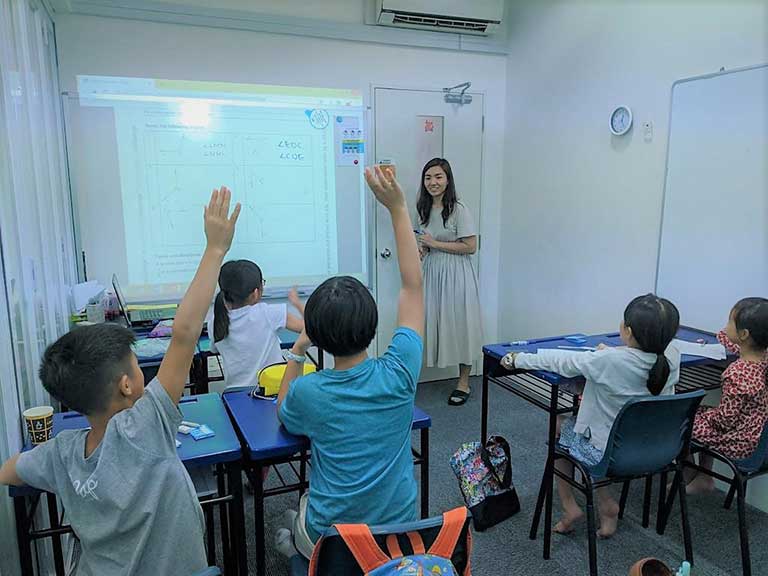
As children progress through primary school, mathematics becomes noticeably tougher and more complex. Problem sums are more complicated, and exams place greater emphasis on problem-solving rather than simple calculation.
It’s not unusual for children to fall behind during this transition, not because they lack ability, but because of poor study habits. Due to factors like ineffective time management or a lack of structured practice, children end up feeling frustrated, less confident, and may even develop an aversion to learning mathematics.
By addressing poor study habits and replacing them with healthier practices, parents can help their child build confidence, improve performance, and even start to enjoy mathematics again.
Whether through consistent at-home support, enrichment programmes, or resources like online math tuition in Singapore, there are many ways to give your child the guidance they need.
Here are six of the study habits that may be holding your child back in primary school mathematics, and how you can fix them:
1. Memorising Without Understanding
Many children memorise math formulas and steps without truly knowing how or why they work.
While this may help them get by with routine questions, they may get confused when faced with non-routine or differently structured questions. Without a strong foundation in math concepts, the child can’t adapt to questions that don’t follow the exact structure they’re used to practising.
How to overcome it:
- Encourage the use of visual aids, including model drawings, diagrams, or physical objects like marbles, to help make abstract concepts concrete.
For example, when teaching fractions, cut an orange or a pizza into 8 equal slices and ask your child to take 3 slices. Then explain that they’re holding 3 out of 8 slices, or ⅜. This helps the child physically interact with the representation of a fraction, instead of simply memorising figures on a page. - Ask your child to “teach back” the concept in their own words. If they can explain the concept clearly, then you’ll know your child actually understands it.
- Build conceptual understanding first, then move on to practice drills to strengthen their problem-solving abilities.
This is an area where well-designed programmes through Singapore math tuition classes at Oodles can make a big difference, as we focus on conceptual mastery rather than rote learning.
2. Avoiding Challenging Questions
When revising on their own, kids may often skip heuristics or problem sums, sticking only to the “easy” questions that they can confidently solve. By avoiding difficult and varied questions, this weakens their resilience and they miss out on developing the mental stamina needed for upper primary and PSLE Math levels in Singapore.
How to overcome it:
- Teach your child to break down challenging problems into smaller, manageable steps so they don’t feel overwhelmed.
Take this question as a simple example: “A baker made 84 pies. He packed them equally into 6 boxes. How many boxes are needed for 42 more pies?”. Guide your child to solve it step by step:
– First, divide 84 by 6 to find how many pies fit in each box.
– Then calculate how many boxes are needed for 42 cupcakes.
This approach shows them how to tackle multi-step word problems without panicking. - Praise effort and perseverance, not just right answers. This will help your child feel more confident about tackling math problems that seem scary or unfamiliar.
- Emphasise that making mistakes is part of the learning process and an opportunity to improve. Getting some answers wrong is a perfectly normal experience in math.
3. Cramming Instead of Practising Consistently
It’s an age-old habit of students everywhere: avoiding regular study sessions in favour of cramming just before exam season. However, children who leave math revision until the last minute may show poor long-term retention, higher stress, and lower exam marks. This is true even if they feel familiar with the topic.
How to overcome it :
- Daily micro-sessions (
10–15 minutes): Have your child do quick, regular math practice sessions daily. This can be in the form of a quick warm-up, like a times-table quiz, one focused activity, and then 2–3 minutes to check answers and note mistakes. - Mix old and new topics: Every week, include 1–2 short reviews of earlier concepts alongside the current chapter. This helps keep your child’s math foundations strong.
- Use bite-sized resources: You can find plenty of short worksheets, flashcards, or apps online that will make daily math practice fun, low-pressure and easy to stick to.
- Keep it consistent, not long: Remember, progress compounds. Twenty minutes every day can be just as, if not more effective, than a long and draining three-hour session once a week.
4. Rushing Through Calculations
When children panic about solving sums in time, they prioritise speed over care and make simple, avoidable mistakes. This costs marks and undermines confidence over time.
How to overcome it:
- Train accuracy first, then speed: Start by letting your child take as long as they need to solve a question accurately. Then repeat the exercise and introduce a time limit, gradually reducing it until your child is comfortable with working under the restriction.
- Teach a simple checking routine: Before submitting a paper or math exercise, have your child go through their answers again:
1. Re-read each question to confirm what’s asked.
2. Check that units/labels (cm, m, kg) in their answers match the ones in the question.
3. Estimate or do a quick mental check to see if their answers are reasonable.
4. Ensure answers are written in the required form (fraction, decimal, whole number). - Praise careful work: Make “double-check first” a household rule in math. Praise your child for being both thorough and quick when completing timed exercises.
To help your child overcome these common math learning pitfalls, consider enrolling them in a math tuition class at Oodles Learning, where expert coaches teach proven strategies for problem-solving, time management, and exam confidence
5. Not Asking for Help When Stuck
Some children may stay quiet when confused about a math concept or question. This could happen out of nervousness, embarrassment, or the fear of looking silly in front of their classmates or teachers. Unfortunately, what starts as a small gap in understanding because of this silence can snowball into bigger struggles later.
How to overcome this:
- Create a safe space for questions: Let your child know it’s perfectly normal to get stuck, confused, or not seem to understand what everyone else has already grasped. Praise them for speaking up at home or in school.
- Normalise “not knowing”: Talk about incidents where you didn’t know or understand something until you asked someone for help. Say things like, “Even adults get stuck sometimes. But there’s no shame in it, because that’s how we learn.”
- Teach question-asking skills: For example, instead of just saying “I don’t get it,” show your child how to say, “I understand the first step, but not the second. Can you explain?”
6. Neglecting Previous Topics
Children tend to focus only on the chapter or topic currently taught in school. This chapter-by-chapter approach fails to account for the fact that math is a cumulative subject. Having weak foundations in earlier concepts makes it harder to grasp new ones as kids progress through the Singapore math syllabus. For instance, poor multiplication skills will make fractions, ratios, and percentages much harder later.
How to overcome this:
- Spiral revision: Build in 1–2 weekly sessions that revisit past topics. For example, if your child is learning geometry now, mix in a few questions on fractions and word problems.
- Short quizzes: Use 5-minute “flash quizzes” to test retention of older material. Online apps are a good source for quizzes like this.
- Keep a “tricky topics” collection: Whenever your child struggles with a question, copy it into a folder or notebook. Revisit these tricky topics regularly until your child feels confident that they have mastered them.
- Mix practice sets: Combine current and older topics in one worksheet to strengthen connections between concepts that may seem very different on the surface.
How Math Tuition Classes at Oodles Learning Can Help
At Oodles Learning, we understand the unique challenges primary school children face as they move through increasingly complex math syllabuses. That’s why our Oodles +hinkingMath programme in Singapore is specially designed to help your child develop not just strong math skills, but the confidence and independence to excel.
- Expert Problem-Solving Strategies: Our proven methods and step-by-step heuristics equip your child with the tools to solve math problems independently, including non-routine and multi-step questions.
- Personalised Attention: With small class sizes, every child receives individualised guidance and support. This safe and encouraging environment makes it easier for children to ask questions, clarify doubts, and feel comfortable making the occasional mistakes.
- Time Management & Exam Skills: Our programme also trains students to manage their time effectively during practice and exams, striking the right balance between speed and accuracy.
- Flexible Online & In-Person Classes: Families can choose between online math tuition classes for convenience or in-person sessions at our centres for face-to-face support, ensuring every child learns in the way that suits them best.
- Experienced, Trained Instructors: Our team of highly qualified and passionate educators ensure that each child’s learning gaps are addressed while nurturing their strengths.
Build Better Math Habits, One Step at a Time

Consistent practice, the right strategies, and timely support can transform your child’s experience with math. By addressing poor study habits early and creating a routine of steady, meaningful practice, children not only strengthen their math foundations but also build confidence, resilience, and a positive mindset toward learning.
Book a free trial class at Oodles Learning today, and discover how we can help your child develop stronger math skills and better study habits for lasting success.







